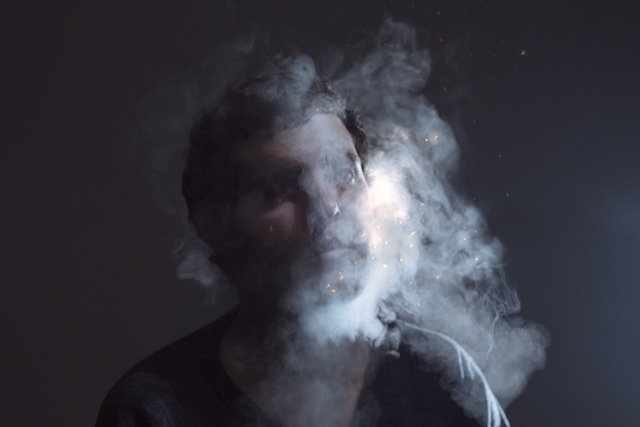Baths, After the Eruption

ABOVE: WILL WIESENFELD, AKA BATHS
Pained, sorrowful, heart-wrenching—these are not words one would usually associate with the music of Los Angeles-based producer Will Wiesenfeld, who records electronic pop under the moniker Baths. Wiesenfeld’s excellent sophomore record, Obsidian, though, is all those things; a mixture of the complex beats he punches out on his Acai MPD pad controller and a rediscovered affinity for emotive vocals and searing lyrics.
The path that led him toward gloomier territory was part personal choice and part series of unfortunate events. By the time Baths started doing press for his previous record, Cerulean, in 2010, he was already interested in broaching bleaker sounds: “It’s looking to be a lot darker and a lot more, sort of, insular and… creepy,” Wiesenfeld told us of the record that would eventually become Obsidian. Little did he know, he would soon have real-world experience to support his new approach.
During the recording process, Wiesenfeld developed a serious case of E. coli that left him bedridden for months and unable to make music. Ironically, the period of illness wound up giving rise to much of the LP. “I was locked into this mode of apathy. I had never not felt anything before,” says Wiesenfeld of his time spent convalescing. The flip side was that his sickness became a source of inspiration. “There’s a very distorted, raw state of mind behind the music,” he says. “It’s this dichotomy. It’s pop music, but it’s tragic and dark.” We caught up with Wiesenfeld to talk his writing process, revamping his live show, and contemplating his own mortality.
NATHAN REESE: The first thing that jumped out at me, even before actually putting on the record for the first time, was the title. “Obsidian” is, at face value, a darker color than “cerulean.”
WILL WIESENFELD: I actually started work on the idea of this record before Cerulean. I had two or three tracks, some of which might come out as b-sides later on. And then my mode after touring behind Cerulean, because I got really sick, was that I got really sad and sort of felt this momentum to try and make this darker record. I’m an extremely positive person, so I felt like this might be the only opportunity that I have. I’m never genuinely depressed or genuinely downtrodden. And I think I felt that way for a while during 2011 and 2012. So all those factors just sort of fell into place, and it made sense to make it.
REESE: The lyrical emphasis on the record is much more pronounced, and your voice is much less processed. Was it difficult moving toward that sound?
WIESENFELD: Before Baths, I had been recording music for a long time, and in a lot of that older music, my vocals were much more front-and-center. The first Baths record was a sort of a pull away from that. And I had less of my vocals on it than anything else I had done, I think, before. It was easier for me to go back this way.
REESE: The first time I heard your music was actually a video of you playing live, where you were playing your MPD and doing a ton of technical work while you were performing. Is that something you want to get away from with the new record?
WIESENFELD: It’s partially that. I’ve been building a new live show that I want to feel more like a band, but still be extremely electronic in its nature. So that’s what’s happening. I have this close friend, Morgan Greenwood, and he and I have been building the new live set together. I still have the MPD on stage, but we have a slew of other things on the table that we’re messing around with and trying to make a live performance out of it.
REESE: Are there physical instruments that are particularly exciting for you to try and incorporate into the set?
WIESENFELD: Well, we have guitar. Morgan is playing guitar, and I’m playing keyboard, and then both of us are singing. It’s nice to have that sort of physicality. It’s kind of all in equal measure to me; every instrument has its purpose and comes into play at the right moments. In terms of writing, everything happens on the piano. As my spiritual regimen of instruments, it’s nicest to have the piano on stage with me.
REESE: And that’s the instrument you grew up playing.
WIESENFELD: Exactly. It’s the thing that I’m most familiar with. But in all my years of doing this live, I’ve never had a piano on stage. It’s nice to make it official.
REESE: Can you tell me a little bit about the song “Phaedra,” and your songwriting process on the album as a whole? Was that song based on the Greek myth, specifically?
WIESENFELD: I used the name Phaedra as more of just a name to yell out, but then there are these mythical thematic elements that weave themselves through the record. For this record, I wanted to work harder on the lyrics. I didn’t want them to be so of the moment. I would have smidges of lyrics that would appear, and I would pull over in my car and type them into my phone. I had something like 350 pages of that on my phone and some on my computer. They were sort of all over the place. I would flip through them all the time and start to piece things together—things that thematically made sense. And sometimes a song would build itself out of that. But other times I would have a specific scene in mind. It was like a puzzle.
REESE: There’s a piano part in “No Past Lives,” where there’s an almost comically upbeat bridge in an otherwise very gloomy song.
WIESENFELD: That song came together musically before the lyrics ever touched it. It was the sonic idea of having something almost ridiculously off-kilter and not really on the beat fall into something that was really loud, dark, low, and very uniform. Without the lyrics, I achieved exactly what I wanted. Every one of those things feels like a jump down a cliff. Like a falling off… I’m trying to explain it in words, but it makes much more sense in music. All the lyrics that met with that had to do with the feel of the music. It wasn’t an afterthought.
REESE: When I first heard the song it was playing in the background. That part really jumped out—it was so jarring. Then I went back and listened a few more times, and it really works in context.
WIESENFELD: [laughs] That’s definitely the feel. It’s supposed to be very awkward. But the more you hear it, the more it makes sense. I imagine at shows people [will] know the song and the timing of that part, and should be able to get into it.
REESE: You mentioned before about how you had E. coli during the writing process. Can you talk a little bit more about your illness?
WIESENFELD: Of course, but it’s just gross to get into it too much. [laughs]
REESE: I bet. You don’t have to go to into the gritty details.
WIESENFELD: Basically, it just left me incapable of doing anything. I spent hours and hours at home for the first two or three months after having dealt with the illness. I had E. coli, and then I took Cipro, which is an antibiotic that kills everything right away. It was the after-effects of that. Just moving from the bed to the couch to the bathroom. That was just awful for me… I’m never sick. I was very unfamiliar with all of that. I was just so devoid of emotions and feeling effort. It kind of scared me when I came out of it—not being myself when I was in that mindset. And that became really, weirdly inspirational for me.
I remember hearing in 11th grade about how apathy related to the Black Death, so I started to read up on that. How the general feel was beyond emotion. Beyond being sad or depressed or angry. People were piling hundreds of children in wheelbarrows in a hole in the ground daily. It was just so fucked and so dark. The idea of somehow warping that to become pop music. That emotional state of mind could be very fucked up, but also an awesome thing for me. The album is supposed to touch on that.
REESE: In “Miasma Sky,” the first line is, “Tall rock shelf, are you maybe here to help me hurt myself?” It’s an interesting combination of something that could be beautiful imagined in a really depressed way.
WIESENFELD: That’s the twist in all the lyrics. A lot of it is positive-sounding at first. It has its own feel and surface value, but as the lyrics start to appear more there is this whole nether world beneath what’s going on. “Miasma Sky” is this sort of pop dance track, but the lyrics are contemplating suicide.
REESE: The song “Incompatible” seems very personal. Was that inspired by a relationship you had?
WIESENFELD: I’ve never actually had a relationship in my life, which is part of the inspiration behind this record and feeling very aggravated with that. That song is the vision of that happening and being a total wreck. And then visions of seeing things in other people’s relationships. Maybe they didn’t have those negative connotations, but they were moments that I took in. It didn’t come from a personal experience, but it sort of is. That’s how all my lyrics work. Moments of things I’ve experienced vicariously and pieced together.
OBSIDIAN IS OUT NOW VIA ANTICON. FOR MORE ON BATHS, VISIT HIS WEBSITE.






